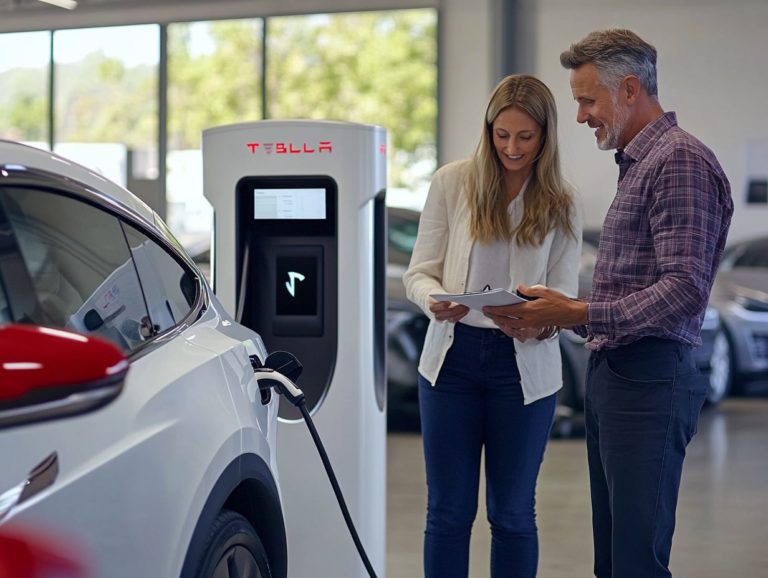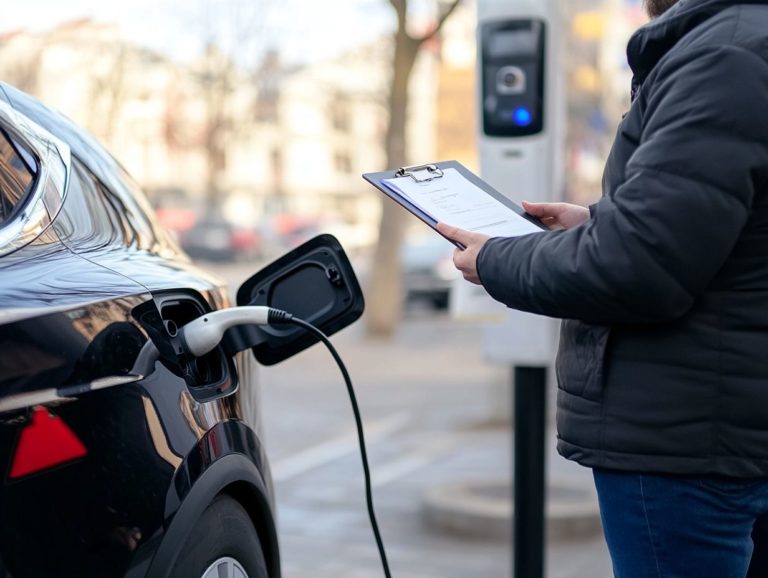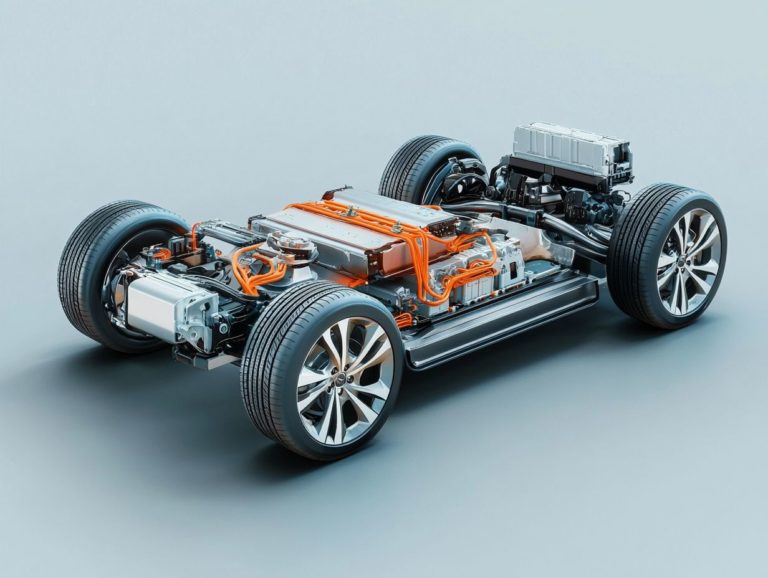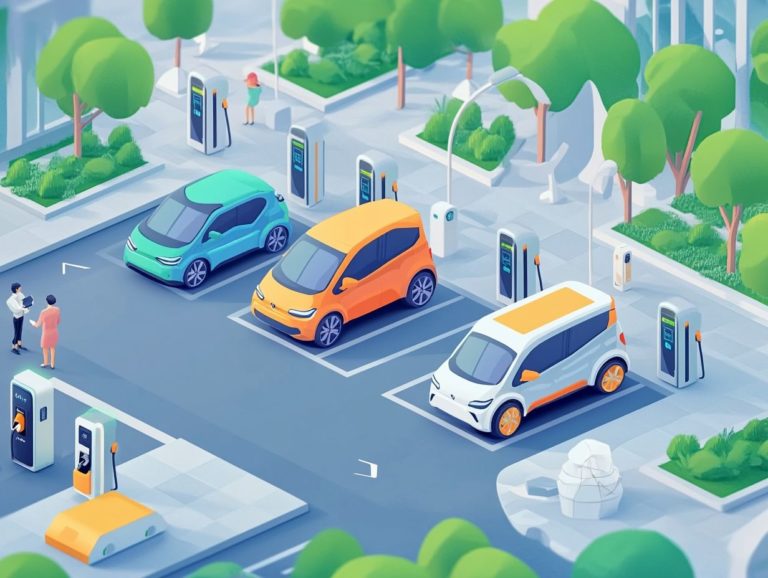what should i know about ev battery recycling?
As electric vehicles (EVs) continue to gain ground in the pursuit of sustainable transportation, your focus should increasingly shift to the vital aspect of EV battery recycling.
With the environmental impact of battery production and disposal looming large, it’s essential to understand how these batteries are processed. This exploration delves into the innovative technologies driving recycling efforts, highlights the significant benefits of conserving resources and reducing waste, and addresses the challenges present in this evolving field.
You ll also discover actionable steps to become an advocate for improved recycling practices. Dive in now and discover the exciting opportunities in EV battery recycling!
Contents
- Key Takeaways:
- The Importance of EV Battery Recycling
- How EV Batteries are Recycled
- Benefits of EV Battery Recycling
- Challenges and Limitations of EV Battery Recycling
- What You Can Do to Support EV Battery Recycling
- Frequently Asked Questions
- What should I know about EV battery recycling?
- Why is EV battery recycling important?
- How are EV batteries recycled?
- Can all types of EV batteries be recycled?
- What happens to the recycled materials from EV batteries?
- How can I ensure my EV battery is properly recycled?
Key Takeaways:

EV battery recycling is crucial for reducing the environmental impact of battery production and disposal. Recycling technologies such as smelting and hydrometallurgy are used to extract valuable materials from EV batteries. For those interested in the latest advancements, understanding what to know about EV technology trends can provide insights into how recycling EV batteries can help conserve resources and reduce waste in the production of new batteries. However, current challenges and limitations must be addressed for effective recycling.
Take action today support EV battery recycling in your community!
The Importance of EV Battery Recycling
The significance of EV battery recycling is very important, particularly as electric vehicles (EVs) gain traction in the pursuit of sustainable transportation.
With the surge in electric car adoption, you may notice a growing demand for lithium-ion batteries. This brings to light pressing environmental concerns surrounding their production and disposal.
By recycling these batteries, you help alleviate the environmental impact linked to gas-powered vehicles. This practice also creates a circular economy within the automotive industry, ensuring that valuable battery components are reused and repurposed effectively.
Environmental Impact of Battery Production and Disposal
The environmental impact of battery production and disposal is a critical issue as you navigate the automotive industry’s shift toward electric vehicles (EVs) and away from gas-powered cars.
While this transition is essential for reducing reliance on fossil fuels, it’s crucial to acknowledge that producing lithium-ion batteries entails processes that significantly contribute to greenhouse gas emissions. Extracting raw materials like lithium, cobalt, and nickel often destroys habitats. This also depletes water resources, worsening environmental issues.
The energy-intensive manufacturing methods used for these batteries also release considerable amounts of greenhouse gases. To address these challenges, you, as a designer or manufacturer, must prioritize eco-design principles. This means focusing on minimizing resource use, enhancing battery longevity, and promoting recycling initiatives.
By doing so, you can help pave the way for a more sustainable future in electric mobility.
How EV Batteries are Recycled
The recycling of EV batteries entails a sophisticated process that plays a crucial role in recovering valuable components while minimizing environmental impact.
It all starts with meticulous battery handling at recycling facilities, where advanced recycling technologies are utilized to extract materials from end-of-life lithium-ion batteries. This ensures that raw materials are efficiently reclaimed for future battery production, contributing to a more sustainable cycle.
Process and Technologies Used
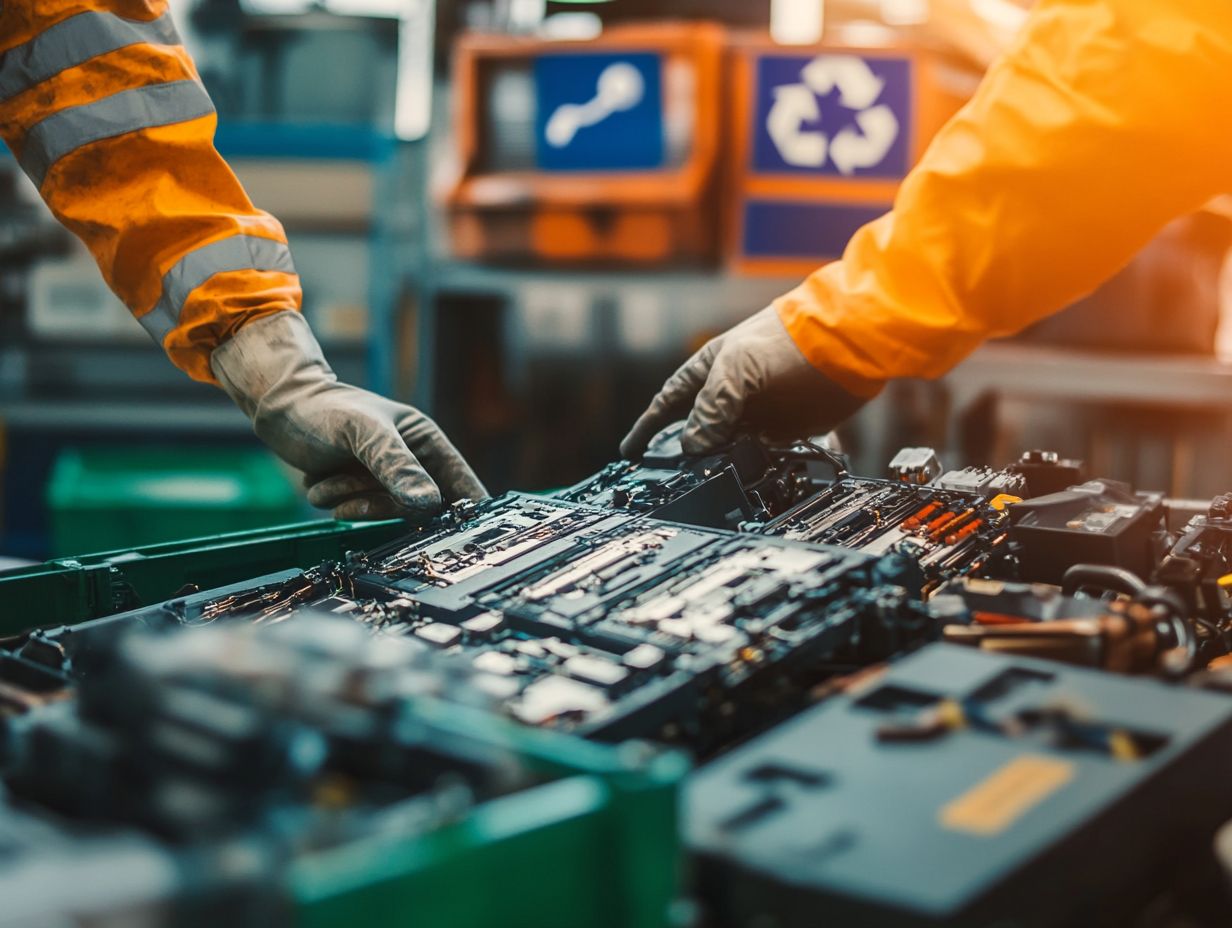
The process of recycling EV batteries incorporates a range of advanced technologies designed to optimize the recovery of valuable components. These methods include hydrometallurgical approaches, which use liquid to extract metals, and pyrometallurgical techniques, where high temperatures are employed to separate materials.
Effective management of battery components is essential, as it not only enhances resource recovery but also significantly reduces environmental impact. The potential for repurposing batteries is increasingly vital, especially when it comes to extending the operational life of electric vehicle batteries. By reusing battery packs for secondary applications, like energy storage systems, you can help the industry maximize the lifecycle of these crucial components while contributing to a more sustainable future.
Benefits of EV Battery Recycling
You will find that EV battery recycling presents a wealth of advantages, especially in minimizing waste and supporting resource conservation in the automotive industry.
This industry is navigating significant environmental challenges and an expanding carbon footprint. By recycling lithium-ion batteries, you can lower the demand for new raw materials, which bolsters sustainable practices and supports a more sustainable economy.
Reducing Waste and Resource Conservation
Reducing waste through EV battery recycling is essential for conserving natural resources.
Recycling facilitates the recovery of valuable materials like lithium, cobalt, and nickel, playing a crucial role in lessening the environmental impact tied to traditional resource extraction methods.
Technology is advancing, significantly improving the capabilities of recycling facilities. This progress enhances the sustainability of manufacturing practices and encourages industries to embrace the use of recycled materials.
Expanding recycling infrastructure supports a transformative mindset, cultivating a culture of sustainability that promotes broader adoption of eco-friendly strategies across various sectors.
Challenges and Limitations of EV Battery Recycling
Despite the numerous benefits of EV battery recycling, you will encounter significant challenges that impede its widespread adoption.
Key obstacles include insufficient recycling infrastructure, regulatory hurdles, and the complexities of managing the battery lifecycle from production to end-of-life treatment.
Current Obstacles and Future Solutions
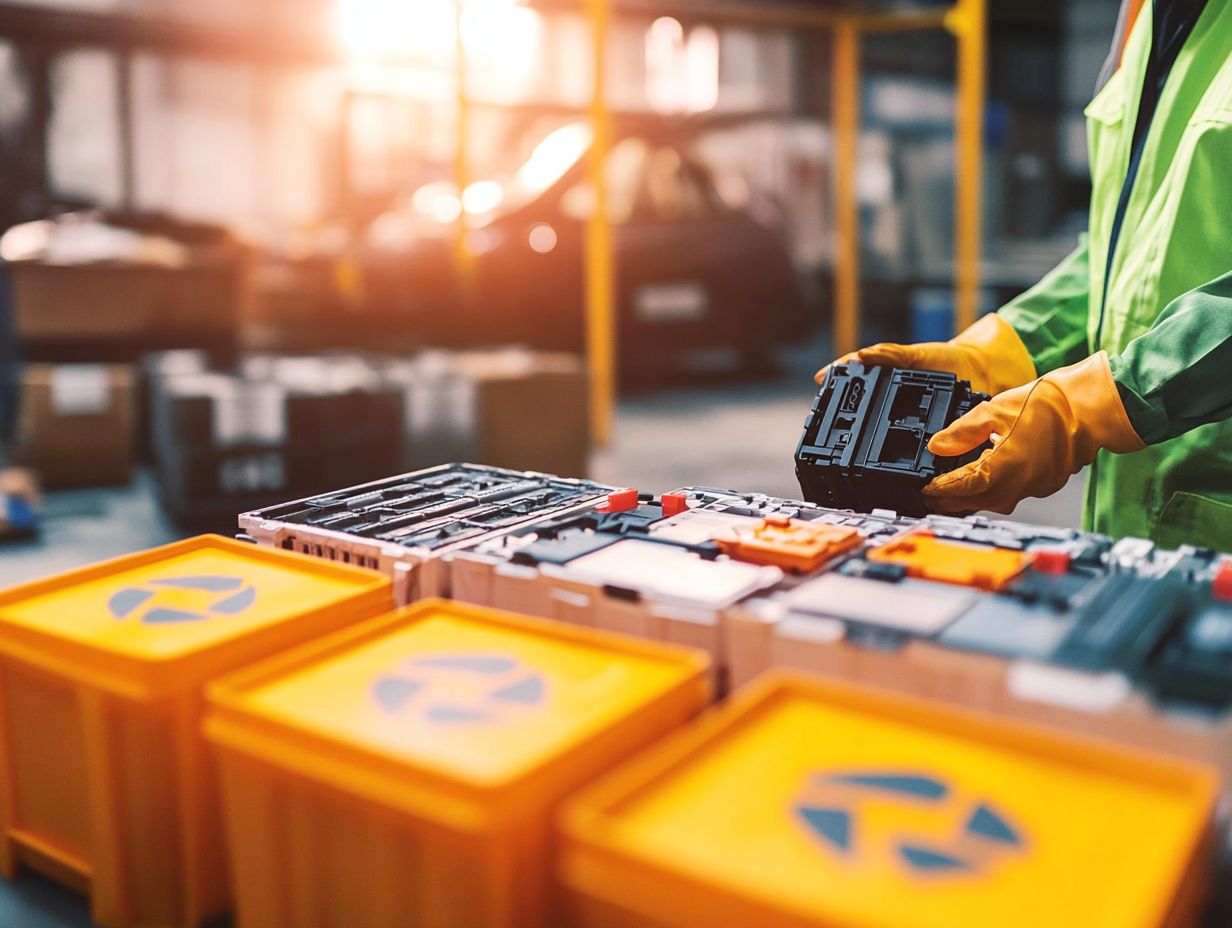
The current obstacles to effective EV battery recycling can be addressed through innovative solutions and supportive recycling legislation.
You may face challenges like inadequate battery handling procedures and inefficient transportation methods that hinder recycling efforts.
Many existing facilities lack the technology necessary for safely processing diverse battery types, creating a bottleneck in the recycling chain.
Future advancements in recycling technologies must focus on enhancing the efficiency of the recycling process. New legislation could incentivize more sustainable practices.
By promoting improved safety protocols and funding research into innovative methods, stakeholders can collaborate to establish a more robust framework for battery recycling that meets evolving demands.
What You Can Do to Support EV Battery Recycling
Supporting EV battery recycling is crucial for fostering a more sustainable future. You can make a meaningful impact through a range of actions and advocacy efforts.
Each step you take contributes to a larger movement toward environmental responsibility. Act now to be part of the solution!
Individual Actions and Advocacy Efforts
You have the power to significantly impact EV battery recycling through various actions and advocacy efforts that elevate recycling initiatives in your community.
Educate friends, family, and neighbors about the importance of proper battery disposal to raise awareness about the environmental benefits of recycling.
Participate in local community programs focused on battery collection. This not only boosts recycling rates but also builds camaraderie among environmentally conscious residents.
Support policies that promote sustainable practices within the automotive industry to amplify your efforts toward greener solutions.
Engage with local policymakers or join organizations dedicated to sustainability. These are effective ways to influence change and contribute to a healthier planet for future generations.
Frequently Asked Questions
What are the main benefits of EV battery recycling?
The primary benefits include reduced waste, conservation of resources, and the promotion of a sustainable economy.
What challenges does EV battery recycling face?
Challenges include insufficient infrastructure, regulatory hurdles, and complexities in managing the battery lifecycle.
How can individuals contribute to EV battery recycling?
Individuals can educate others, participate in community collection programs, and support sustainable policies.
In conclusion, supporting EV battery recycling is vital for a sustainable future. Your actions matter, so join the movement for a cleaner planet today!
What should I know about EV battery recycling?
Did you know that recycling EV batteries is crucial for our planet s future?
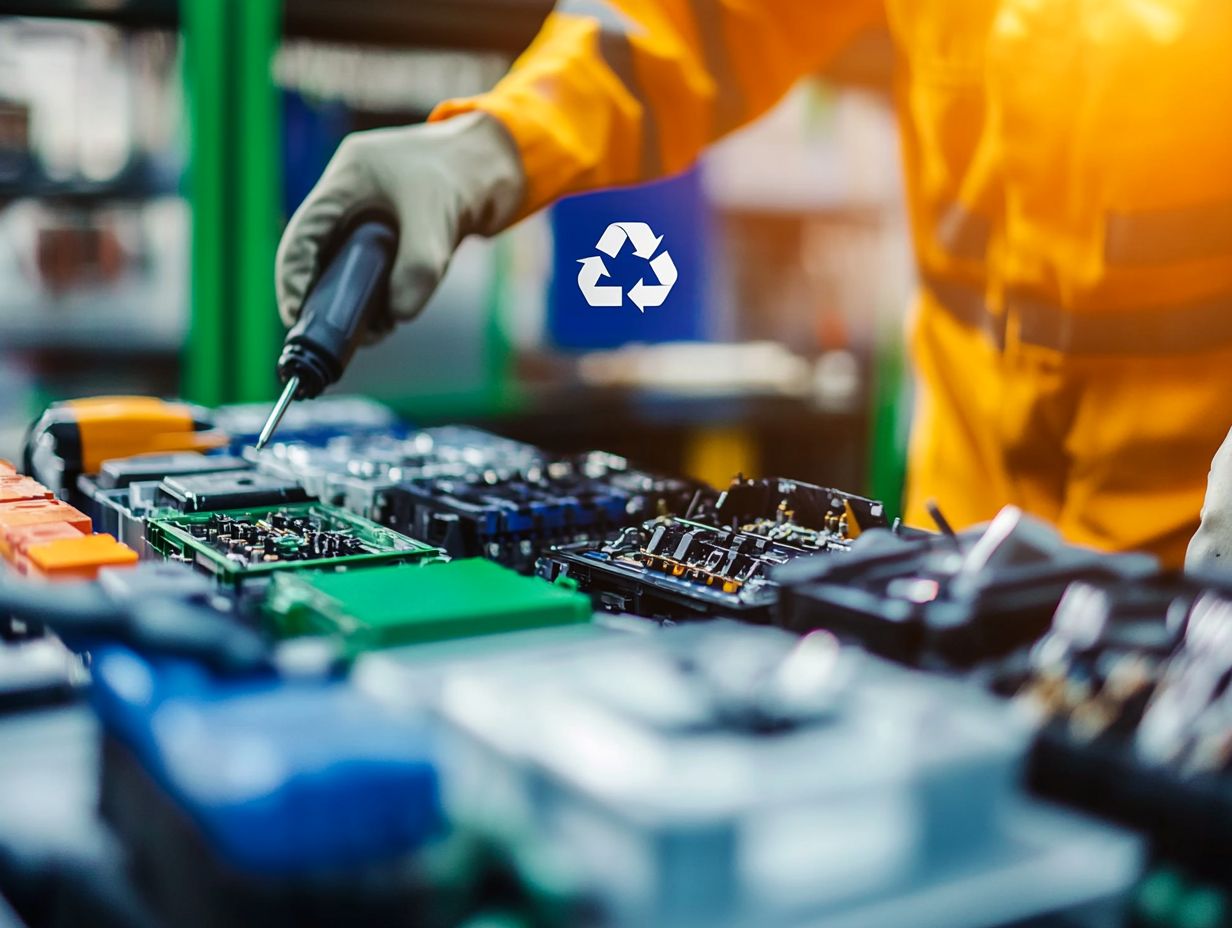
EV battery recycling refers to the process of safely and responsibly disposing of used electric vehicle (EV) batteries. As more people switch to EVs, proper battery recycling is becoming increasingly important to minimize environmental impact and promote sustainability.
Why is EV battery recycling important?
EV battery recycling helps prevent toxic chemicals from leaching into the environment.
It also reduces the need for new materials, which can harm our planet. Additionally, recycling EV batteries can recover valuable materials that can be reused in new batteries.
How are EV batteries recycled?
The recycling process for EV batteries typically involves several steps.
First, the battery is dismantled to separate out different materials, such as lithium (a metal used in batteries), cobalt (a metal often found in electronics), and nickel (a component in many batteries). Then, these materials are processed and purified for use in new batteries. Finally, any remaining waste is disposed of in an environmentally responsible way.
Can all types of EV batteries be recycled?
While most EV batteries can be recycled, the recycling process may vary depending on the type of battery.
Some batteries, such as lithium-ion batteries, are easier to recycle than others. It is important to check with your local recycling facilities for their specific recycling capabilities.
What happens to the recycled materials from EV batteries?
The materials recovered from recycled EV batteries can be used in various ways.
Most commonly, they are reused to produce new batteries. However, they can also be used in other products, such as electronics and energy storage systems. This helps reduce the demand for new materials and promotes a more circular economy.
How can I ensure my EV battery is properly recycled?
To ensure your EV battery is properly recycled, it is important to follow the manufacturer’s recommendations for disposal.
Many EV manufacturers have programs in place to take back and recycle their batteries. You can also check with your local recycling facilities to see if they accept EV batteries and how they handle their recycling process. Act now to make a difference!
Join us in promoting a sustainable future by recycling your EV battery responsibly!



